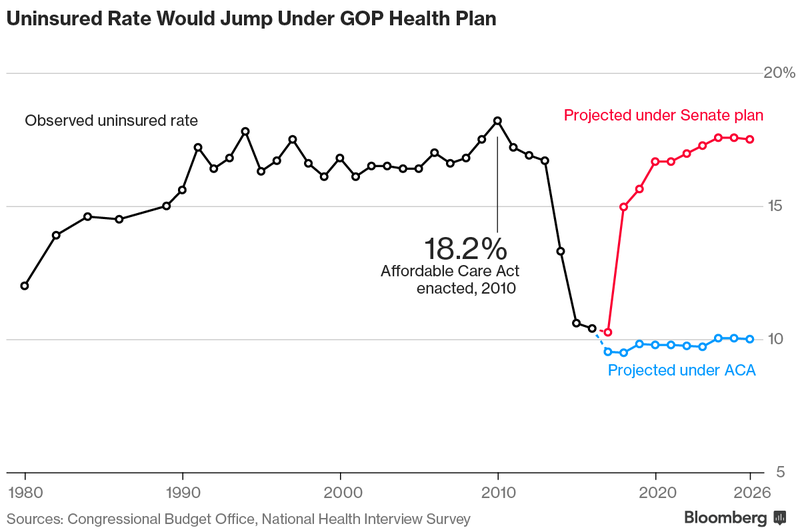Jane Harrod, a landscaper in central Kentucky, was installing a hog fence on her family farm with a “spud bar,” a long, iron tool often used as a lever to move rocks. Suddenly, she recalled, it “came like a rocket and hit me in my forehead.” The blow, back in November 2014, didn’t leave a bruise, but the next morning she couldn’t see out of half of her right eye. Harrod’s retina was detaching, and a doctor told her she needed urgent surgery to avoid permanent blindness.
“I don’t have insurance, and I don’t have a lot of money,” she told him.
Harrod, 64, makes about $14,000 a year from landscaping, care-giving jobs, and working on the farm with her siblings. It’s been in her family since 1804. Baptist Health Hospital in Lexington, Kentucky, helped her sign up for a health plan under the Affordable Care Act that cost about $125 per month. The coverage paid for most of the $6,000 eye surgery, months of follow-up care, and an additional cataract procedure a year later that restored her vision.
“No doubt, that was a lot of financial help right there,” Harrod said. The insurance allowed her to stay in the workforce and return to the tough, outdoor labor she’s done her whole life. “I would cost the system a lot more if I were on disability and on food stamps, and if I went in and said I just can’t function anymore,” she said.
Since the 1970s, as America’s income gap has widened, one of the most powerful drivers of inequality has been the growing cost of health care. The ACA, President Barack Obama’s signature domestic achievement, expanded the safety net for people such as Harrod, who lived one bad turn away from financial disaster, extending coverage to about 20 million Americans and cutting the share of uninsured by almost half since 2013.

Soon, it may be a thing of the past. Senate Republicans, having returned from their July 4 break, resumed negotiations to replace Obamacare with legislation that could lead to 15 million fewer people being insured next year, and 22 million fewer by 2026, according to the non-partisan Congressional Budget Office.
Some insurers are exiting the state marketplaces created by the ACA, leaving parts of the country with no insurers selling Obamacare plans. Republicans cite these departures as evidence that the law is failing and needs to be replaced. Senate Majority Leader Mitch McConnell, a Kentucky Republican, has said that a bipartisan plan to stabilize the marketplaces will be needed if his divided caucus can’t agree on a replacement. Democrats counter that the shaky state of Obamacare is directly related to a refusal by Republicans to support it since its passage.
If the current GOP effort to roll back the law succeeds, it’s not just health care that may suffer. Economic inequality and health disparities are linked, and replacing Obamacare is likely to make the twin problems of financial insecurity and poor health worse for those at the bottom of the income ladder. “We do know that people who are healthier are more productive and are more likely to work,” said Barbara Wolfe, a health economist at the University of Wisconsin-Madison. “We also know that the people who are most affected by the expansion [of health coverage], and would be most affected by cutbacks, are people with lower incomes.”
The Senate bill in its current form would cut taxes on the wealthy and the medical industry, reduce subsidies for insurance coverage, and, for the first time in U.S. history, cap the growth of federal Medicaid spending. The proposed reductions in this state-federal program for low income and disabled people, created under President Lyndon Johnson as part of his Great Society initiatives, “dwarf the increases that occurred through the ACA,” said Henry Aaron, a Brookings Institution economist.
In 2014, Aaron estimated that Obamacare would have a clear economic effect, boosting the incomes of the bottom fifth of Americans by from 3.4 to 5.3 percent, depending on how health insurance is valued. If the Senate bill's cuts to Medicaid become law, those gains would be reversed and then some. The CBO estimated that, in 20 years, federal funding for Medicaid would be reduced by 35 percent (PDF) compared with current law.








